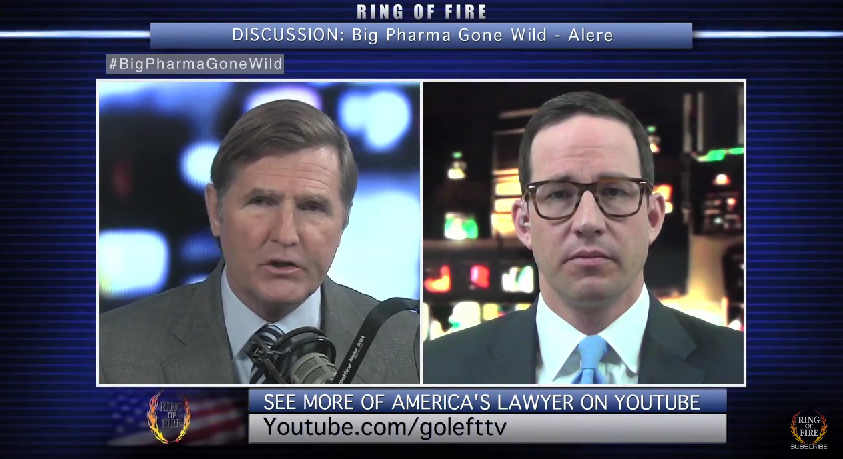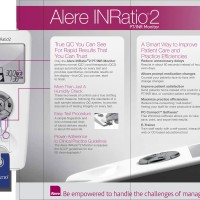
David Haynes, The Cochran Firm, D.C.’s managing attorney, was recently interviewed on Ring of Fire about Alere INRatio lawsuits and the FDA recall of the home PT/INR monitoring device. Ring of Fire is broadcast throughout the United States on Free Speech TV and also distributed on radio stations throughout the country.
Mike Papantonio is a senior partner at the Levin Papantonio law firm, one of America’s largest plaintiff’s law firms. He has handled thousands of cases across the country dealing with pharmaceutical drugs, tobacco, securities fraud and many other areas of plaintiff litigation.
David Haynes is the managing partner at The Cochran Firm, D.C. He has obtained many multi-million dollar settlements for his clients and represents victims hurt by the negligence and wrongdoing of others.
Alere INRatio lawsuit Ring of Fire TV interview transcript
Papantonio: The FDA is tasked with testing, reviewing, and either approving or rejecting every single drug and every single medical device before it reaches the hands of consumers. But a combination of budget cuts and industry influence is preventing the agency from doing its job. I have David Haynes with me now to talk about that.
David, how many times have we started the segments where the FDA blows it again. Here again is another story where the FDA blew it again. Because they’re dysfunctional, because you really can’t count on anything coming out of the FDA that’s really meaningful as far as protecting your life. Tell me this INRatio story. This is an awful story.
Haynes: It really is. It’s of terrible concern. Alere INRatio monitor is a system which uses a test strip for individuals who are on anticoagulation therapy, so warfarin type therapy, and its a crucial test because it tests the clotting factor in their blood, or how thin or how thick the blood may be. The doctors and the patients use this in order to adjust their warfarin therapy, coumadin and drugs of that nature. Alere INRatio monitor has about half of the market for these in-home tests. This product has finally been recalled by the FDA in December after an initial recall in May of just the test strips, in 2014, because the product was defective. The reading looked to be normal.
Papantonio: Okay, so let me get this right – so the company itself says “we have a defective product” and they do a recall. The FDA, you’re talking about seven months, the FDA waits seven months before they do a mandatory recall. Even though the company that makes the damn product says “this is a defective product were gonna pull it off the market.” Did I get that right?
Haynes: Yes, and the May recall initially was on the strips and then the December recall was on the monitor. Also, our firm has discovered that there actually was an initial, you talk about FDA dysfunction, Pap, back in 2005 the predecessor company by the name of Hemosense, which was the company that was making these monitors at this time, there were significant irregularities at that time. The FDA had warned them but really took no action, put no teeth into it. So this is a problem we believe goes back to as early as 2005 and here we are 10 years later.
Papantonio: The average citizen believes, and this is what so amazing to me, the average person out there believes that the FDA is looking out for them. Nothing is farther from the truth. This is another example. Now let me repeat what we just said. The company that was making the product understood it was defective so they do a voluntary recall, no mandatory recall. Seven months pass before the FDA gets involved and does a mandatory recall on the parts of this product. It’s just mind boggling to me. So let’s talk about what does this mean for this product being defective. Lay it out how people end up dying because this product is defective.
Haynes: As I mentioned before, this a product used by folks who are on anticoagulation therapy such as warfarin, coumadin. They have an issue with clotting, concerns about atrial fibrillation, or other factors like that. Its very important that they test their blood. Some individuals are testing their blood daily, weekly, and so forth. They prick their finger, put it on a test strip which goes into the monitor, and then they’re given a reading. So if you’re on a warfarin-type therapy a therapeutic range is from about 2.0 to 3.0.
Papantonio: A therapeutic range means you’re trying to keep a person from having a blood consistency that will cause an atrial fibrillation, which will kill them, or its a level that the blood is too thin and they’ll bleed to death. Those are the two extremes, is that correct?
Haynes: That’s right. They could be subject to blood clots, pulmonary embolism, heart attack, things of that nature. So the doctors want to try and keep it in that therapeutic range so that’s very critical. What’s happening with Alere is that the strips are testing artificially low. So their number looks a lot lower than their their clotting factor and their INR actually is.
Papantonio: What does it mean when its low? What does that mean for the patient when its testing low?
Haynes: Well, it looks lower than it is. So in fact their INR is a lot higher.
Papantonio: What is an INR and what does it mean for the patient?
Haynes: That’s your International Normalized Ratio. That’s basically the clotting factor of an individual’s blood. Part of the plasma, the liquid part of their blood and how quickly it clots. So they want to keep it in that therapeutic range and if they go outside of that, if their INR becomes too high which means that their blood becomes too thin which is the opposite part of the anticoagulation issue that they’re trying to address, now the warfarin has made their blood too thin.
Papantonio: So if its too thin, what are the dangers?
Haynes: Very serious dangers which could result in a number of different bleeding injuries including subdural hematoma, other problems, other bleeding injuries, stroke, and it can result in serious injury and death.
Papantonio: Subdural hematoma simply means that blood goes to the brain and expands and it damages the brain and people die. Is that what you’re talking about here?
Haynes: Exactly.
Papantonio: Okay so brain bleeds that cause people to die, that’s one of the factors with the blood being too thin. Minor injuries also are a factor, they can bleed to death like we saw with Pradaxa. Correct? Like were seeing with Xarelto.
Haynes: Correct.
Papantonio: They cut themselves, they go to the emergency room, and they bleed to death. So this strip becomes very import because of that, doesn’t it? Because it’s telling people “look, your blood’s too thin, or its too thick”, you can die either way. Right?
Haynes: Exactly. Its a crucial, life-sensitive result and test that these patients are relying on with their lives. So what’s happening is that the test looks to be in the therapeutic or the safe range, say 2 to 3.0, but in fact the actual INR might be twice that. But they don’t know. They call the doctor say maybe they test at a 2.5 and the doctor says “keep on taking the same coumadin dose, everything is fine.” But in in fact their INR, their clotting factor, might be 6 which means their blood is way too thin. And what happens is then maybe they suffer a nosebleed or a cut or something like that as you mentioned or they might be developing a bleed in their brain and don’t know it until its too late. The patient then arrives at the hospital and a plasma based test is done and at that point the reading is coming back maybe twice what they tested at home because of the defect in the Alere monitor.
Papantonio: And the FDA knew about it, they let this ride for seven months after the company said “we got a problem.” They kept it out there because its dysfunctional, it’s the FDA that’s useless in every kind of way. And I gotta tell you something, I tell everybody this all the time. Unless a product has been on the market for 10 years you can’t trust the product because you have an FDA that is completely owned by the industry, the pharmaceutical industry, or completely dysfunctional in the way they do their job. This is a classic example of it. David, I will follow this case its going to be another one where a lot of people die unnecessarily. David Haynes, thank you for joining me.
Haynes: Thank you.




